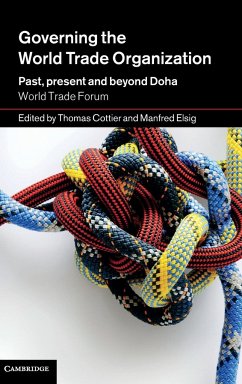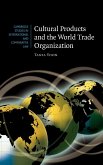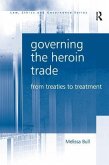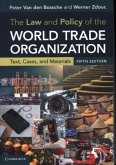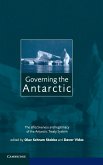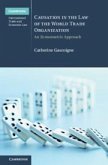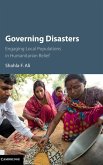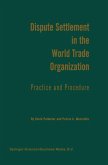Governing the World Trade Organization
Herausgeber: Cottier, Thomas; Elsig, Manfred
Governing the World Trade Organization
Herausgeber: Cottier, Thomas; Elsig, Manfred
- Gebundenes Buch
- Merkliste
- Auf die Merkliste
- Bewerten Bewerten
- Teilen
- Produkt teilen
- Produkterinnerung
- Produkterinnerung
Discusses the various challenges the WTO faces and provides policy-relevant ideas to reform WTO governance.
Andere Kunden interessierten sich auch für
![Cultural Products and the World Trade Organization Cultural Products and the World Trade Organization]() Tania VoonCultural Products and the World Trade Organization155,99 €
Tania VoonCultural Products and the World Trade Organization155,99 €![Governing the Heroin Trade Governing the Heroin Trade]() Melissa BullGoverning the Heroin Trade195,99 €
Melissa BullGoverning the Heroin Trade195,99 €![The Law and Policy of the World Trade Organization The Law and Policy of the World Trade Organization]() Peter Van den BosscheThe Law and Policy of the World Trade Organization51,99 €
Peter Van den BosscheThe Law and Policy of the World Trade Organization51,99 €![Governing the Antarctic Governing the Antarctic]() Olav Schram Stokke / Davor Vidas (eds.)Governing the Antarctic132,99 €
Olav Schram Stokke / Davor Vidas (eds.)Governing the Antarctic132,99 €![Causation in the Law of the World Trade Organization Causation in the Law of the World Trade Organization]() Catherine GascoigneCausation in the Law of the World Trade Organization125,99 €
Catherine GascoigneCausation in the Law of the World Trade Organization125,99 €![Governing Disasters Governing Disasters]() Shahla F. AliGoverning Disasters112,99 €
Shahla F. AliGoverning Disasters112,99 €![Dispute Settlement in the World Trade Organization Dispute Settlement in the World Trade Organization]() N. David PalmeterDispute Settlement in the World Trade Organization103,99 €
N. David PalmeterDispute Settlement in the World Trade Organization103,99 €-
-
-
Discusses the various challenges the WTO faces and provides policy-relevant ideas to reform WTO governance.
Hinweis: Dieser Artikel kann nur an eine deutsche Lieferadresse ausgeliefert werden.
Hinweis: Dieser Artikel kann nur an eine deutsche Lieferadresse ausgeliefert werden.
Produktdetails
- Produktdetails
- Verlag: Cambridge University Press
- Seitenzahl: 368
- Erscheinungstermin: 28. April 2011
- Englisch
- Abmessung: 235mm x 157mm x 24mm
- Gewicht: 683g
- ISBN-13: 9781107004887
- ISBN-10: 1107004888
- Artikelnr.: 32557278
- Herstellerkennzeichnung
- Libri GmbH
- Europaallee 1
- 36244 Bad Hersfeld
- gpsr@libri.de
- Verlag: Cambridge University Press
- Seitenzahl: 368
- Erscheinungstermin: 28. April 2011
- Englisch
- Abmessung: 235mm x 157mm x 24mm
- Gewicht: 683g
- ISBN-13: 9781107004887
- ISBN-10: 1107004888
- Artikelnr.: 32557278
- Herstellerkennzeichnung
- Libri GmbH
- Europaallee 1
- 36244 Bad Hersfeld
- gpsr@libri.de
1. Introduction Thomas Cottier and Manfred Elsig; 2. The origins and back
to the future: a conversation with Ambassador Julio Lacarte; 3. After
globalization? WTO reform and the new global political economy Tony McGrew;
4. Internal measures in the multilateral trading system: where are the
borders of the WTO agenda? Marion Jansen; 5. Legitimising global economic
governance through transnational parliamentarisation: how far have we come?
How much further must we go? Markus Krajewski; 6. Adapting to new power
balances: institutional reform in the WTO Amrita Narlikar; 7. Delegation
chains, agenda control, and political mobilisation: how the EU Commission
tries to affect domestic mobilisation on the DDA Bart Kerremans; 8.
Developing countries and monitoring WTO commitments in response to the
global economic crisis Chad Bown; 9. Exploring the limits of institutional
coherence in trade and development Kent Jones; 10. The WTO as a 'living
instrument': the contribution of consensus decision-making and informality
to institutional norms and practices Mary Footer; 11. Crisis situations and
consensus seeking: adaptive decision making in the FAO and applying its
lessons to the reform of the WTO Robert Kissack; 12. A post-Montesquieu
analysis of the WTO Steve Charnovitz; 13. Reforming the WTO: the
decision-making triangle revisited Manfred Elsig and Thomas Cottier; 14.
Barriers to WTO reform: intellectual narrowness and the production of
path-dependent thinking Rorden Wilkinson.
to the future: a conversation with Ambassador Julio Lacarte; 3. After
globalization? WTO reform and the new global political economy Tony McGrew;
4. Internal measures in the multilateral trading system: where are the
borders of the WTO agenda? Marion Jansen; 5. Legitimising global economic
governance through transnational parliamentarisation: how far have we come?
How much further must we go? Markus Krajewski; 6. Adapting to new power
balances: institutional reform in the WTO Amrita Narlikar; 7. Delegation
chains, agenda control, and political mobilisation: how the EU Commission
tries to affect domestic mobilisation on the DDA Bart Kerremans; 8.
Developing countries and monitoring WTO commitments in response to the
global economic crisis Chad Bown; 9. Exploring the limits of institutional
coherence in trade and development Kent Jones; 10. The WTO as a 'living
instrument': the contribution of consensus decision-making and informality
to institutional norms and practices Mary Footer; 11. Crisis situations and
consensus seeking: adaptive decision making in the FAO and applying its
lessons to the reform of the WTO Robert Kissack; 12. A post-Montesquieu
analysis of the WTO Steve Charnovitz; 13. Reforming the WTO: the
decision-making triangle revisited Manfred Elsig and Thomas Cottier; 14.
Barriers to WTO reform: intellectual narrowness and the production of
path-dependent thinking Rorden Wilkinson.
1. Introduction Thomas Cottier and Manfred Elsig; 2. The origins and back
to the future: a conversation with Ambassador Julio Lacarte; 3. After
globalization? WTO reform and the new global political economy Tony McGrew;
4. Internal measures in the multilateral trading system: where are the
borders of the WTO agenda? Marion Jansen; 5. Legitimising global economic
governance through transnational parliamentarisation: how far have we come?
How much further must we go? Markus Krajewski; 6. Adapting to new power
balances: institutional reform in the WTO Amrita Narlikar; 7. Delegation
chains, agenda control, and political mobilisation: how the EU Commission
tries to affect domestic mobilisation on the DDA Bart Kerremans; 8.
Developing countries and monitoring WTO commitments in response to the
global economic crisis Chad Bown; 9. Exploring the limits of institutional
coherence in trade and development Kent Jones; 10. The WTO as a 'living
instrument': the contribution of consensus decision-making and informality
to institutional norms and practices Mary Footer; 11. Crisis situations and
consensus seeking: adaptive decision making in the FAO and applying its
lessons to the reform of the WTO Robert Kissack; 12. A post-Montesquieu
analysis of the WTO Steve Charnovitz; 13. Reforming the WTO: the
decision-making triangle revisited Manfred Elsig and Thomas Cottier; 14.
Barriers to WTO reform: intellectual narrowness and the production of
path-dependent thinking Rorden Wilkinson.
to the future: a conversation with Ambassador Julio Lacarte; 3. After
globalization? WTO reform and the new global political economy Tony McGrew;
4. Internal measures in the multilateral trading system: where are the
borders of the WTO agenda? Marion Jansen; 5. Legitimising global economic
governance through transnational parliamentarisation: how far have we come?
How much further must we go? Markus Krajewski; 6. Adapting to new power
balances: institutional reform in the WTO Amrita Narlikar; 7. Delegation
chains, agenda control, and political mobilisation: how the EU Commission
tries to affect domestic mobilisation on the DDA Bart Kerremans; 8.
Developing countries and monitoring WTO commitments in response to the
global economic crisis Chad Bown; 9. Exploring the limits of institutional
coherence in trade and development Kent Jones; 10. The WTO as a 'living
instrument': the contribution of consensus decision-making and informality
to institutional norms and practices Mary Footer; 11. Crisis situations and
consensus seeking: adaptive decision making in the FAO and applying its
lessons to the reform of the WTO Robert Kissack; 12. A post-Montesquieu
analysis of the WTO Steve Charnovitz; 13. Reforming the WTO: the
decision-making triangle revisited Manfred Elsig and Thomas Cottier; 14.
Barriers to WTO reform: intellectual narrowness and the production of
path-dependent thinking Rorden Wilkinson.

